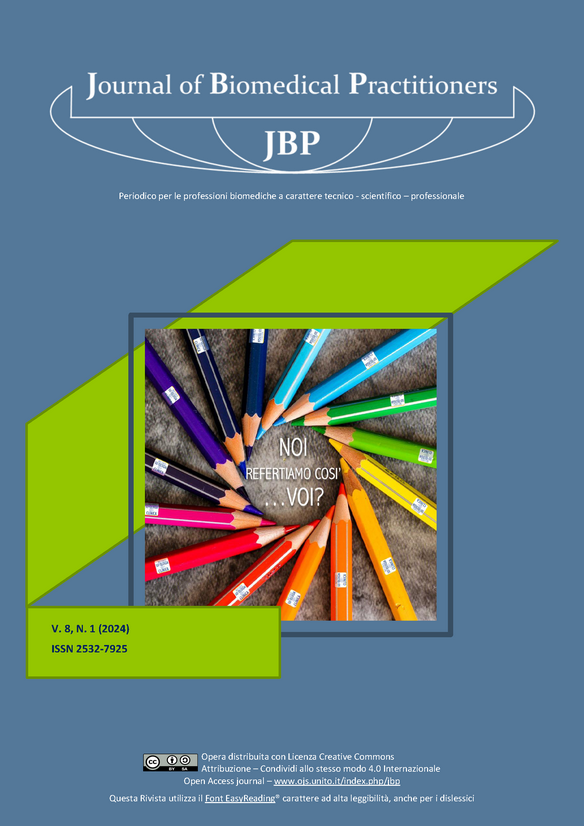Placebo effect and nocebo effect: implications for nursing practice.
Main Article Content
Abstract
Introduction
Placebo effect can be defined as a generic improvement in a personal subjective discomfort or in the clinical manifestation of the disease, as result of an external intervention or interaction which has nothing to do with the condition under investigation. Nocebo effect has been described as an undesirable result produced from negative psyco-social contexts surrounding the patient environment and the delivering of treatment but not linkable to the patient. Both of them represent different psycho-neurobiological phenomena arising during the therapeutic relationship between the patient and the health and care professional. To investigate the placebo and nocebo effect, with particular attention towards the contextual factors of the same effects activation and the implications related to nursing care.
Materials and methods
literature based review through bibliographic research carried out on the PubMed and CINAHL databases. Articles published from 2008 until today’ s date, written in English and available in full text, were included. The keywords used for the bibliographic search are: “nocebo effects”, “placebo effects”, “nursing”, “contextual factors”, “therapeutic relationship”
Results
Considering evidence-based literature it is clear that all the clinical –care interventions taken in account are not separable elements: the first is the intervention itself while the second one is based on the context . The context can include both individual factors related to the patient and healthcare professionals, as well as interaction between patient, healthcare professionals and the environment where the treatment is performed. It has been shown that contextual factors influence nursing interactions and patient ‘s outcomes, triggering placebo/nocebo effects.
Discussion and conclusions
The nurse-patient relationship can strongly influence the triggering of the placebo and nocebo effect, considering the quantity and quality of time and interactions by which is characterized. Placebo and nocebo effects are part of all the aspects linked to the nursing care and it is essential to understand them in order to improve clinical outcomes. Despite growing interest, knowledge and awareness of the use of contextual factors involved in the triggering of placebo effects and the elimination of nocebo effects , is currently limited and heterogeneous.
Downloads
Article Details
The authors agree to transfer the right of their publication to the Journal, simultaneously licensed under a Creative Commons License - Attribution that allows others to share the work indicating intellectual authorship and the first publication in this magazine.
References
[2] Bagarić B, Jokić-Begić N, Sangster Jokić C. The Nocebo Effect: A Review of Contemporary Experimental Re-search. Int J Behav Med. 2022 Jun;29(3):255-265.
[3] Finniss D. G. Placebo Effects: Historical and Modern Evaluation. International review of neurobiology 2018; 139, 1–27.
[4] Tavel M. E. The placebo effect: the good, the bad, and the ugly. The American journal of medicine 2014; 127(6), 484–488.
[5] Benedetti, F., & Amanzio, M. Mechanisms of the placebo response. Pulmonary pharmacology & therapeutics 2013; 26(5), 520–523.
[6] Palese, A., Cadorin, L., Testa, M., Geri, T., Colloca, L., & Rossettini, G. Contextual factors triggering placebo and nocebo effects in nursing practice: Findings from a national cross-sectional study. Journal of clinical nursing 2019; 28(9-10), 1966–1978.
[7] Colloca L. Nocebo effects can make you feel pain. Science 2017; 358(6359), 44.
[8] Rossettini, G., Carlino, E., & Testa, M. Clinical relevance of contextual factors as triggers of placebo and nocebo effects in musculoskeletal pain. BMC musculoskeletal disorders 2018; 19(1), 27.
[9] Testa, M., & Rossettini, G. Enhance placebo, avoid nocebo: How contextual factors affect physiotherapy out-comes. Manual therapy 2016; 24, 65–74.
[10] Gay, C. W., & Bishop, M. D. Research on placebo analgesia is relevant to clinical practice. Chiropractic & manual therapies 2014; 22(1), 6.
[11] Palese, A., Rossettini, G., Colloca, L., & Testa, M. The impact of contextual factors on nursing outcomes and the role of placebo/nocebo effects: a discussion paper. Pain reports 2019; 4(3), e716.
[12] Häuser, W., Sarzi-Puttini, P., Tölle, T. R., & Wolfe, F. Placebo and nocebo responses in randomised controlled trials of drugs applying for approval for fibromyalgia syndrome treatment: systematic review and meta-analysis. Clinical and experimental rheumatology 2012; 30(6 Suppl 74), 78–87.
[13] Evers, A. W. M., Colloca, L., Blease, C., Annoni, M., Atlas, L. Y., Benedetti, F., Bingel, U., Büchel, C., Carvalho, C., Colagiuri, B., Crum, A. J., Enck, P., Gaab, J., Geers, A. L., Howick, J., Jensen, K. B., Kirsch, I., Meissner, K., Napadow, V., Peerdeman, K. J., … Kelley, J. M. Implications of Placebo and Nocebo Effects for Clinical Practice: Expert Consensus. Psychotherapy and psychosomatics 2018; 87(4), 204–210.
[14] Druart, L., Bailly-Basin, E., Dolgopoloff, M., Rossettini, G., Blease, C., Locher, C., Kubicki, A., & Pinsault, N. Using contextual factors to elicit placebo and nocebo effects: An online survey of healthcare providers' practice. PloS one 2013; 18(9), e0291079.
[15] F. Benedetti. Placebo-Induced Improvements: How Therapeutic Rituals Affect the Patient's Brain, Journal of Ac-upuncture and Meridian Studies, Volume 5, Issue 3, 2012, Pages 97-103, ISSN 2005-2901, https://doi.org/10.1016/j.jams.2012.03.001.
[16] F. Benedetti F. How the doctor’s words affect the patient’s brain. Evaluation & Health Professions, 2002, 25, 369-86

